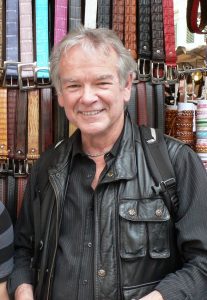Ralph Young goes against the grain.
 Young, a history professor at Temple University and author of Dissent: The History of an American Idea will provide a historical context of dissent at the 10:45 a.m. morning lecture Monday, July 23, in the Amphitheater to open Week Five, “The Ethics of Dissent.”
Young, a history professor at Temple University and author of Dissent: The History of an American Idea will provide a historical context of dissent at the 10:45 a.m. morning lecture Monday, July 23, in the Amphitheater to open Week Five, “The Ethics of Dissent.”
To Young, dissent is more than a “disagreement” — it’s a structural change.
“Generally, dissent emanates from grassroots movement like the civil rights movement and (pushes) against the power or structure to make fundamental changes,” he said. “So disagreement isn’t necessarily trying to make change, but dissent is trying to do that — it’s trying to get laws overturned that are negatively impacting one group’s rights.”
Young’s book, Dissent, extensively covers the history of dissent in America’s foundation and its history — from Puritan Anne Hutchinson, who was at the center of the Antinomian Controversy, a religious and political conflict in the Massachusetts Bay Colony during the 1630s, to the Occupy and Tea Party movements in the 21st century.
“At its founding, the United States committed itself to lofty ideals. When the promise of those ideals was not fully realized by all Americans, many protested and demanded that the United States live up to its promise,” Young wrote in the description of his book “… Some dissenters are celebrated heroes of American history, while others are ordinary people.”
Despite the book’s descriptive title, The History of an American Idea, Young said dissent is not solely an American idea, but that the United States is one of a handful of countries that has the right to dissent embedded in its constitution.
“American dissent, I feel, has influenced a lot of other countries as well,” he said. “For example, in Europe in 1968, you had the Prague Spring, you had the Paris uprisings, you had student protests in Berlin, and I think a lot of that got some of its influence from what was going on in the United States at that time with the civil rights movement and the anti-war movement.”
For Young, dissent is a gray area; it is not exclusive to progressive movements. He also classifies current movements like those of the alt-right and the Ku Klux Klan as dissent.
“I do think of the alt-right and the KKK as dissent movements because they are protesting against the reality that exists today, which is usually what protests are doing,” he said. “They are protesting against the status quo.”
Dissent is also a gray moral area. Young will pose questions in his lecture about whether dissent should have a higher moral comparative, if the act of dissent should ever escalate to violence and where the line is drawn between civil discourse and disobedience.
“I think there is a line that separates the two, but I think that when people are being very oppressed they might start getting involved in violence, and that creates a whole other issue — should dissent ever be violent?” he said. “One of the major dissent movements in American history led to the American Revolution, which was very violent, though we were born out of that very violent dissent.”
The morals of dissent will be at the center of Young’s visit to Chautauqua Institution. While on the grounds, Young will also be hosting conversations throughout the week as a scholar-in-residence. During these conversations, Young will give an in-depth look into dissent movements across three different eras of American history, as well as the morality of ethics.
This is Young’s first visit to the Institution, but he is eager to engage with Chautauquans about timely issues.
“I suppose in one way it might sort of be preaching to the choir because dissent is in the genes of Chautauquans. … I think dissent is central to American history,” Young said. “It’s been one of main forces that has created the United States, but at the same time, today in the current political climate, I think dissent is even more important than ever. And so it is a very timely subject.”




